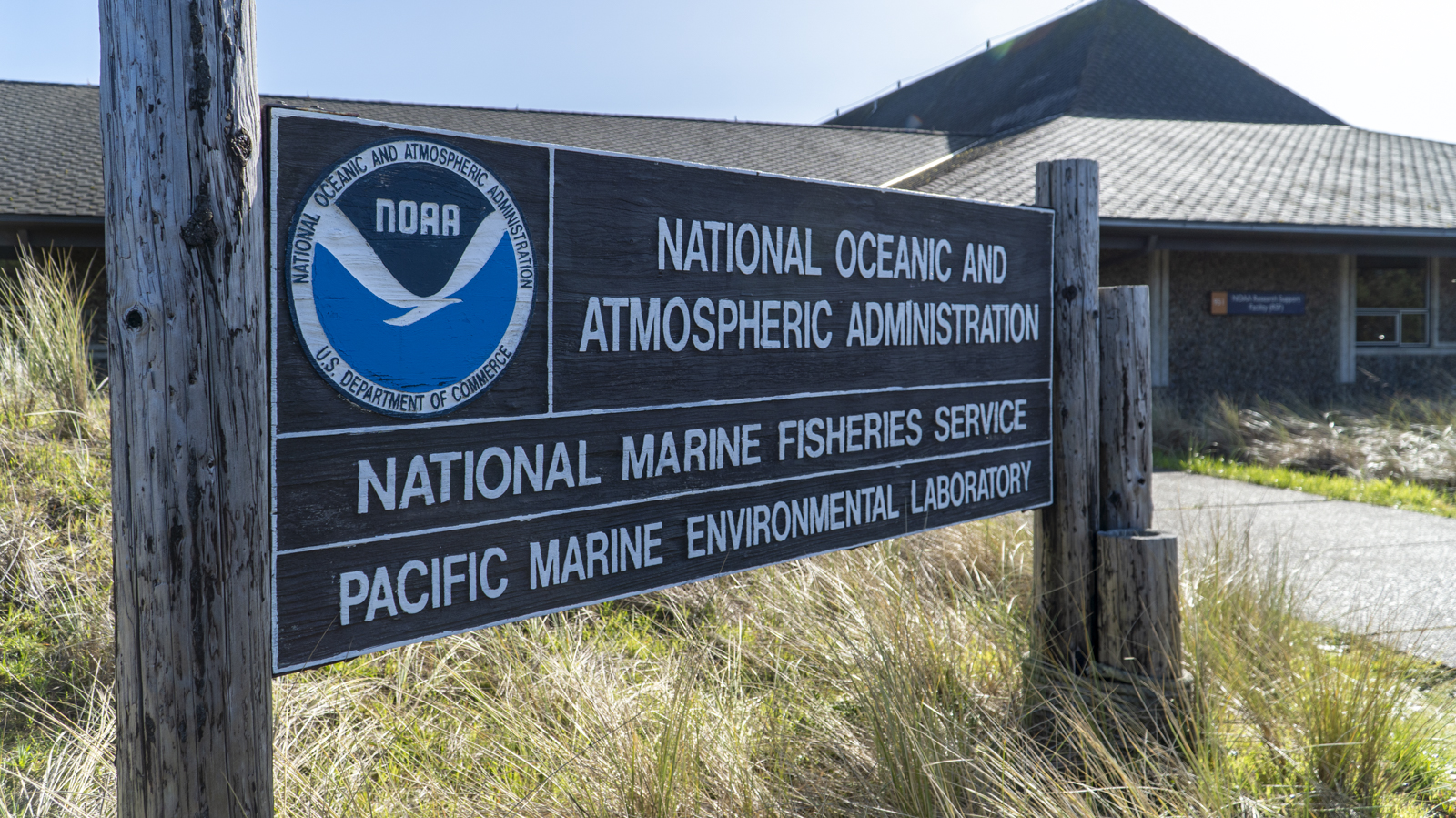
By KATIE FRANKOWICZ/KMUN Radio
The long-term impacts of staff cuts at the National Oceanic and Atmospheric Administration are still unknown, but fishery managers on the West Coast say the situation is troubling.
On Feb. 27, NOAA laid off more than 800 workers as the Trump administration continues its push to reduce the federal workforce.
On Saturday, the New York Times reported that the nation’s premier agency for weather and climate science has been told by the Trump administration to prepare to lose another 1,000 workers.
The new dismissals would come in addition to the roughly 1,300 NOAA staff members who have already resigned or been laid off in recent weeks. The moves have alarmed scientists, meteorologists and others at the agency, which includes the National Weather Service. Some activities, including the launching of weather balloons, have already been suspended because of staffing shortages. Together, the reductions would represent nearly 20 percent of NOAA’s approximately 13,000-member work force.
NOAA manages federal tribal, commercial and recreational fisheries and includes the National Weather Service.
West Coast lawmakers have warned that the cuts — and the potential for additional layoffs — could endanger lives and threaten maritime commerce and the fishing industry. For West Coast fisheries, the firings have created uncertainty for fishery management.
Last week, the Pacific Fishery Management Council, a quasi-governmental body that recommends management measures for a number of fisheries on the West Coast, met to begin — among other things — the process of setting summer and fall salmon seasons.
Typically, this involves a high degree of collaboration and input from state and federal agencies and other stakeholders. NOAA employees, in particular, provide key data that informs the council’s recommendations. Much of the information needed for this year’s salmon management discussions has already been pulled together.
“Fortunately, we are a long ways down that road this year,” Merrick Burden, executive director for the Pacific Fishery Management Council told Astoria-based KMUN radio. “How this affects next year, we don’t know yet.”
One more immediate area of concern is groundfish, an important and highly managed West Coast fishery that includes around 90 species. The Pacific Fishery Management Council and its partners are only just beginning their regular look at these fish.
“I fully expect that the cuts and hiring freezes that NOAA is going through right now will affect that process and our ability to measure the health of our groundfish stocks,” Burden said.

Building blocks
Fisheries management is like a series of building blocks and each block serves a purpose, Burden said. It starts with data collection and turning that data into scientific products that help fishery managers understand and measure how fisheries are doing.
With this information, the Pacific Fishery Management Council can make course corrections: opening fisheries, restricting fisheries. All are key tools to ensure the long-term sustainability of the resource and continued access for the fishing industry and recreational fishers, Burden said.
NOAA is the largest science and data collection provider for the council and other fishery managers, Burden said. “And when they start hemorrhaging staff and capacity it affects everyone.”
Brad Pettinger, a longtime commercial fisherman and chair of the Pacific Fishery Management Council, agreed, saying the firings will impede essential work to keep fisheries operating within legal parameters.
He believes there’s an argument for cutting positions and making things more efficient, but under the current framework for fisheries management, the NOAA positions are needed. Pettinger and others don’t know yet the full extent of the firings, and he said the fishing industry, on the whole, has been left in the dark.
“The administration folks aren’t talking to people in the industry about what they really need,” Pettinger said, adding, “I don’t think there’s any feedback happening … people reaching out and saying, ‘Hey, what’s gonna happen if we do this?’”
In a recent letter, Nick Tolimieri, president of the fisheries chapter of the International Federation of Professional and Technical Engineers Local 8a, urged Pettinger and other members of the Pacific Fishery Management Council to “sound the alarm” and “call for a stop on any mass layoffs and to refuse drastic budget cuts.”
He pointed to the work by staff in NOAA’s Northwest and Southwest Fisheries Science Centers to develop scientific models and surveys, support fisheries management, gather and analyze economic data and research ecosystem conditions that influence West Coast fisheries.
“Agency staffing levels are already failing to keep pace with needs,” Tolimieri wrote, “and the proposed extreme cuts to federal staffing and funding represent an existential threat to our ability to do this work.”
Lots of uncertainty
Officials with NOAA declined to comment on the firings except to say they involved probationary workers. Other sources told KMUN that, in addition to recent hires, the firings may have included longtime NOAA employees who had been recently promoted and were still on probationary status.
On the West Coast, the states have a hand in regulating a number of key fisheries like Dungeness crab and shrimp. Pettinger said this could give local fishermen a cushion for now as uncertainty emerges in federally managed fisheries.
Still, there is no escape from the uncertainty.
Oregon relies on research and data collected by NOAA scientists for salmon seasons and also works with the Bonneville Power Administration, the Army Corps of Engineers and the Department of the Interior — all of which are dealing with cuts or face the possibility of cuts.
While Oregon fishery managers can try to fill any gaps that emerge, there are limits, both logistically and because of what is laid out by statute.
“We can try to pick up some of the analytical pieces to some degree,” said Tucker Jones, the ocean salmon and Columbia River program manager for the Oregon Department of Fish and Wildlife. “But there are some things … from the jurisdictional standpoint that we cannot do.”
“There’s a lot of uncertainty everywhere with our federal colleagues,” he added, “and, honestly, I feel for them right now. They’re all humans and, in a lot of cases, friends. … This is an incredibly difficult time for them.”
- This story is part of a collaboration between The Astorian newspaper and Coast Community Radio.





















Thankfully, the morality of the free market will not allow for wonton resource depletion or despoilment.
I am assuming John’s comment was meant to be sarcastic?